新概念一67
新概念第一册 lesson 67-68 课堂及课后练习
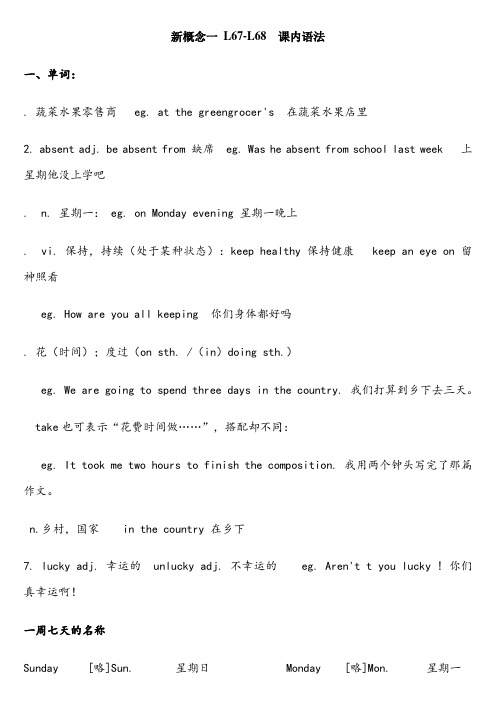
新概念一L67-L68 课内语法一、单词:. 蔬菜水果零售商 eg. at the greengrocer's 在蔬菜水果店里2. absent adj. be absent from 缺席 eg. Was he absent from school last week 上星期他没上学吧. n. 星期一: eg. on Monday evening 星期一晚上. vi. 保持,持续(处于某种状态):keep healthy 保持健康 keep an eye on 留神照看eg. How are you all keeping 你们身体都好吗. 花(时间);度过(on sth. /(in)doing sth.)eg. We are going to spend three days in the country. 我们打算到乡下去三天。
take也可表示“花费时间做……”,搭配却不同:eg. It took me two hours to finish the composition. 我用两个钟头写完了那篇作文。
n.乡村,国家 in the country 在乡下7. lucky adj. 幸运的 unlucky adj. 不幸运的 eg. Aren't t you lucky ! 你们真幸运啊!一周七天的名称Sunday [略]Sun. 星期日 Monday [略]Mon. 星期一Tuesday [略]Tues. 星期二 Wednesday [略]Wed. 星期三Thursday [略]Thur(s)星期四 Friday [略]Fri. 星期五Saturday [略]Sat. 星期六 Weekday周日,工作日(周一至周五)Weekend周末(星期六和星期日)二、课文详注:1、Were you at the butcher's刚才您在肉店里吗at the butcher 's=at the at the butcher 's shop。
新概念第一册67课课文
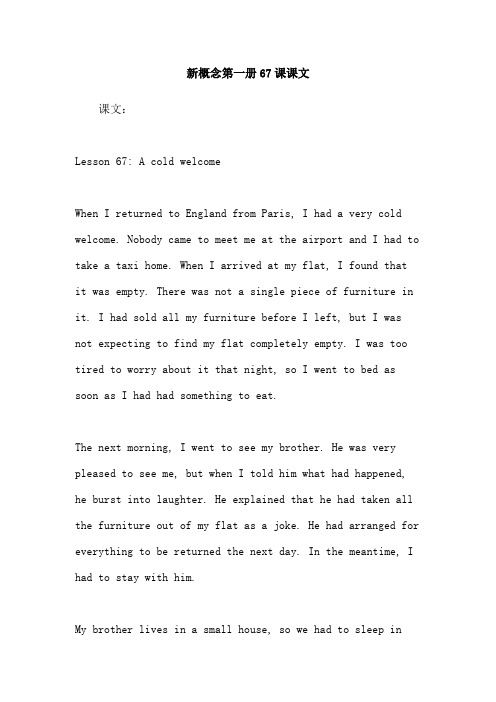
新概念第一册67课课文课文:Lesson 67: A cold welcomeWhen I returned to England from Paris, I had a very cold welcome. Nobody came to meet me at the airport and I had to take a taxi home. When I arrived at my flat, I found that it was empty. There was not a single piece of furniture in it. I had sold all my furniture before I left, but I was not expecting to find my flat completely empty. I was too tired to worry about it that night, so I went to bed as soon as I had had something to eat.The next morning, I went to see my brother. He was very pleased to see me, but when I told him what had happened, he burst into laughter. He explained that he had taken all the furniture out of my flat as a joke. He had arranged for everything to be returned the next day. In the meantime, I had to stay with him.My brother lives in a small house, so we had to sleep inthe same room. He kept me awake half the night by snoring. He also talked in his sleep, which was even more disturbing. The following day, we collected the furniture and took it back to my flat. My brother helped me to unpack and soon everything was in its right place.From then on, I decided to take a taxi whenever I went anywhere. Unfortunately, however, I had the same taxidriver several times in succession. He kept on telling me the same jokes and I had to give him a tip every time. In the end, I sold my car and that was the last I saw of the taxi driver.。
新概念英语第一册第67课

• Yes, he did. No, he didn't.
• What did he do this morning?
12
一般过去时的疑问句: Did +主语+谓语动词+其它
他今天早上看上去身体很好。
•He looked very well this morning. •Did he look very well this morning? •他今天早上洗盘子了。 •He washed the plates this morning.
他们在1990年是老师。
They were teachers in 1990. They weren't teachers in 1990. Were they teachers in 1990? Yes, they were. No, they weren't. What were they in 1990? What did they do in 1990? What were their jobs in 1990? 问职业……
16 16
一般过去时的否定
They were in the garden on Sunday.
They were not in the garden on Sunday. He was absent from school on Monday. He was not absent from school on Monday.
20
greengrocer
• • • •
n. 蔬菜水果零售商
她们昨天在在蔬菜水果店了吗? Were they at the greengrocer ’s yesterday ? 那个蔬菜水果店在哪儿? Where is that greengrocer’s?
新概念英语第一册Lesson67_72语法及单词

新概念英语第一册Lesson67~72语法及单词新概念英语第一册Lesson67~68语法及单词语法Grammar in use一般过去时be( am/is/are)的过去式是was/were:在英文中,过去发生的而现在已经结束的动作要用一般过去时来表示。
be动词的过去式不规则,第1人称与第3人称单数用was,其他情况用were。
用be动词的一般现在时形式的一般疑问句及特殊疑问句迄今已介绍过,其过去时形式也一样,只是动词be在形式上变为was或were。
请看以下例句:Was Mrs.Johnson at the butcher’s?约翰逊夫人在肉店吗?No,sha wasn’t.她不在。
Were you at school or at church ou January 1st ?1月1号你在学校还是上教堂了?I wasn't at school on January 1 st .I was at church.我1月1号没上学。
我上教堂做礼拜了。
When was he absent from school ?他何时缺课了?He was absent on Monday,Tuesday,Wednesday and Thursday . 他周一、周二、周三和周四缺课了。
Where were you on Sunday ?周日你在哪儿?I was at church on Sunday.我周日在教堂做礼拜。
词汇学习Word study1. spend v.(1)花(时间等);度过:Where are the Johnsons going to spend the weekend ?约翰逊一家准备到哪儿去度这个周末?I hope that you wouldn’t spend so much time watching television.我希望你不要花这么多的时间看电视。
(2)用(钱),花费:I’m going to spend all my money this weekend !这个周末我要把我所有的钱都花掉!At present,more and more people have come to realize that more money should he spent on health and education.目前,越来越多的人已开始认识到:应该在健康和教育方面多花些钱。
新概念第一册Lesson67-68
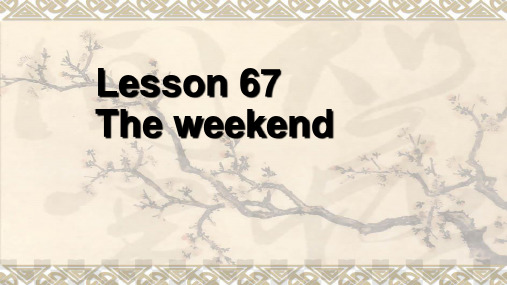
第二人称单数,复数 are were
(You)
How many days in a week?
There are seven days in a week. What are they?
Monday Tuesday Wednesday Thursday Friday Saturday Sunday
Yes, I was. / No, I wasn’t.
Were you at the office on Tuesday?
Yes, I was. / No, I wasn’t.
1.I was at school last Sunday.
Were you at school last Sunday? Yes, I was. / No, I wasn’t. 2.They were ten years old last year. Were they ten years old last year? Yes, they were. / No, they weren’t.
Was Mrs. Williams at the butcher’s last Tuesday? Yes, she was.
Was Mrs. Williams at the baker’s last Tuesday?
No, she wasn’t.
Was Mrs. Williams in the church last Thursday? Yes, she was.
主+was/were+其他
I am at home today.
I was at Jimmy’s home yesterday.
was
am
was
is
最新新概念第一册-Lesson-67-68-课堂及课后练习资料
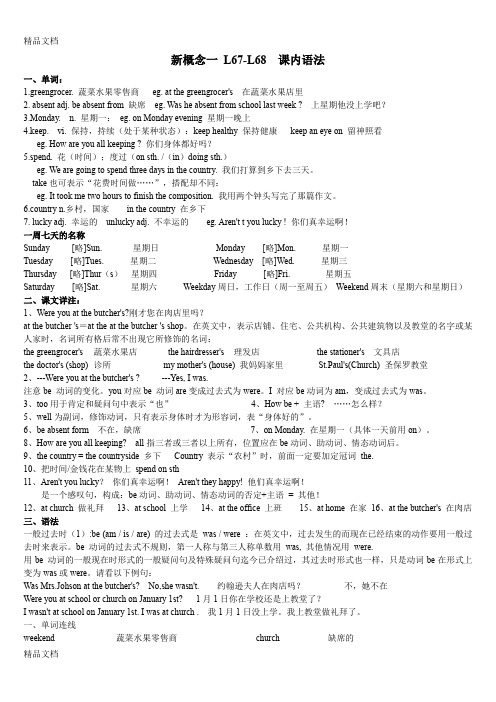
新概念一L67-L68 课内语法一、单词:1.greengrocer. 蔬菜水果零售商eg. at the greengrocer's 在蔬菜水果店里2. absent adj. be absent from 缺席eg. Was he absent from school last week ? 上星期他没上学吧?3.Monday. n. 星期一:eg. on Monday evening 星期一晚上4.keep. vi. 保持,持续(处于某种状态):keep healthy 保持健康keep an eye on 留神照看eg. How are you all keeping ? 你们身体都好吗?5.spend. 花(时间);度过(on sth. /(in)doing sth.)eg. We are going to spend three days in the country. 我们打算到乡下去三天。
take也可表示“花费时间做……”,搭配却不同:eg. It took me two hours to finish the composition. 我用两个钟头写完了那篇作文。
6.country n.乡村,国家in the country 在乡下7. lucky adj. 幸运的unlucky adj. 不幸运的eg. Aren't t you lucky ! 你们真幸运啊!一周七天的名称Sunday [略]Sun. 星期日Monday [略]Mon. 星期一Tuesday [略]Tues. 星期二Wednesday [略]Wed. 星期三Thursday [略]Thur(s)星期四Friday [略]Fri. 星期五Saturday [略]Sat. 星期六Weekday周日,工作日(周一至周五)Weekend周末(星期六和星期日)二、课文详注:1、Were you at the butcher's?刚才您在肉店里吗?at the butcher 's=at the at the butcher 's shop。
新概念英语第一册Lesson-67-68练习题

Lesson 67 and Lesson 68一用所给词的适当形式填空(10分)1. Was Mrs. Williams at the (butcher)?2. Was Jimmy (absence) from school last week?3. How are you today? I’m very (good).4. We’re going to spend three (day) in the country.5. We’re going to stay at my (mother) for the weekend.6. You are (luck) to stay in the country on Friday, Saturday and Sunday.7. I was at the (baker) yesterday.8. I stay at home on Sunday, August the (eight).9. She is enjoying (her).10. I can hear some birds (sing) in the tree.二用所给词的适当形式填空(10分)1. They (be) at the dairy on Saturday, July 7th.2. How you all (keep) now?3. We are going to spend three days (stay) in country.4. We are going to stay at my mother’s (spend) the weekend.5. you (take) any food to the bird every day?6. Before you cross a street, you must (look) to the right first and then to the left.7. Where is Jill going (meet) her friends?8. The girl is helping her mother (wash) the clothes.9. What do you buy these apples (do)?10. Martin (teach) in a village school.三选择填空(20分)( ) 1. Where you last week?A. isB. areC. wasD. were ( ) 2. Jim at school last Monday.A. isB. areC. wasD. were ( ) 3. Jimmy was absent school last week.A. forB. fromC. withD. of( ) 4. were you at the hairdresser’s? On Thursday.A. HowB. WhatC. WhenD. Why ( ) 5. Mrs. Johnson was at the greengrocer’s some cabbages.A. toB. onC. ofD. for( ) 6. How are you all ? Very well, thank you.A. goingB. keepingC. goD. keep ( ) 7. He is going to spend a week in the country.A. to stayB. stayingC. stayD. stays ( ) 8. Meimei buys some bananas some bananas pies.A. makeB. to makeC. makingD. makes ( ) 9. How much does she spend this pair of shoes.A. forB. inC. onD. of( ) 10. What’s the matter? you enjoy yourself?A. DoB. Don’tC. AreD. Aren’t you ( ) 11. He is often at the to get some meat.A. baker’sB. grocer’sC. the grocer’sD. butcher’s ( ) 12. Don’t make a noise. The baby .A. sleepB. sleepsC. sleepingD. is sleeping ( ) 13. We often hear him about it.A. to talkB. talkingC. talksD. talk( ) 14. Reading in bed is bad your eyes.A. onB. ofC. forD. to( ) 15. He enjoys interesting books.A. to readB. readsC. readingD. read ( ) 16. There is cheese and butter at the 。
新概念英语第一册课文翻译及学习笔记Lesson67
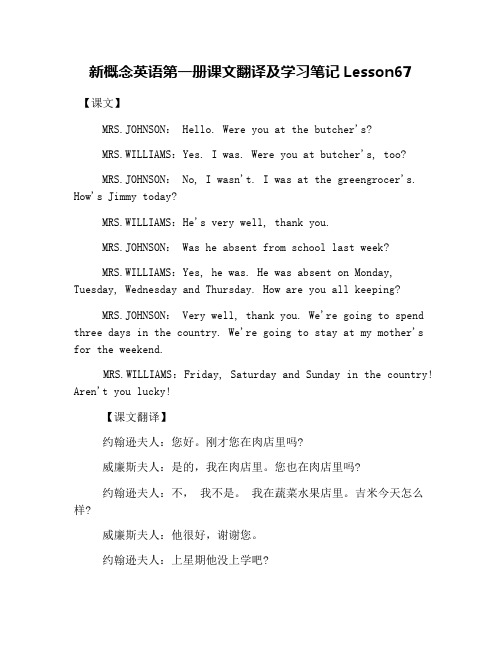
新概念英语第一册课文翻译及学习笔记Lesson67【课文】MRS.JOHNSON: Hello. Were you at the butcher's?MRS.WILLIAMS:Yes. I was. Were you at butcher's, too?MRS.JOHNSON: No, I wasn't. I was at the greengrocer's. How's Jimmy today?MRS.WILLIAMS:He's very well, thank you.MRS.JOHNSON: Was he absent from school last week?MRS.WILLIAMS:Yes, he was. He was absent on Monday, Tuesday, Wednesday and Thursday. How are you all keeping?MRS.JOHNSON: Very well, thank you. We're going to spend three days in the country. We're going to stay at my mother's for the weekend.MRS.WILLIAMS:Friday, Saturday and Sunday in the country! Aren't you lucky!【课文翻译】约翰逊夫人:您好。
刚才您在肉店里吗?威廉斯夫人:是的,我在肉店里。
您也在肉店里吗?约翰逊夫人:不,我不是。
我在蔬菜水果店里。
吉米今天怎么样?威廉斯夫人:他很好,谢谢您。
约翰逊夫人:上星期他没上学吧?威廉斯夫人:是的,他没上学。
他星期一、星期二、星期三和星期四没去上学。
你们身体都好吗?约翰逊夫人:很好,谢谢您。
我们打算到乡下去三天,在我母亲家度周末。
新概念第一册lesson67重难点整理

新概念第一册lesson67重难点整理一.词汇部分扩展:(默写重点)1. greengrocer n. 蔬菜水果零售商--知识点相关语法:在英文中,表示店铺、住宅、公共机构、公共建筑物以及教堂的名字或某人家时,名词所有格后常不出现它所修饰的名词:at the greengrocer's在蔬菜水果店at the butcher's 在肉店at the dentist's 在牙医的诊所at the hairdresser's 在理发店at the statio ner’s在文具店at my mother‘s在我妈妈家=at mother’s home2. absent adj. 缺席的:be absent from 不在,缺席be absent from school 缺课be absent from work 旷工3. spend v. 度过:用法:spend 时间/金钱 +(in) doing sth.spend时间/金钱+on+sth4.country:1.国家,故乡2.乡村,农村:表示农村时一定要加the--词组:country life乡村生活5.keep保持:keep doing sth保持做某事keep the fire burning让火一直燃烧着--词组:keep-away防范keep fit保持身材keep fit activity保健运动6.lucky幸运的:lucky day幸运日lucky dog=lucky bargeex幸运儿good luck=break your leg祝你好运lucky draw幸运抽奖7.Monday星期一:cheap Monday瑞典潮流品牌便宜星期一Bloody Monday电影《血色星期一》Mondays每个星期一8.Saturday星期六:Saturday night live周末夜现场Saturday night fever周末夜狂热9.Sunday星期日:Sunday school主日学校Sunday-go-to-meeting最好的,最漂亮的(美国俚语)二.课文内容重点:1.in the country=in the countryside到乡下2.three days=three-day ytime三天in three days三日之内in three days’ time三天后3.for the weekend是指整个周末这几天的时间at the weekend是强调时间的某一点4.well(adj)表示身体好:I am well(adv)修饰动词:he swims well5.how are you all keeping=how are you?你好吗?三.时态大杂烩:知识点回顾:1.一般现在时:时间状语:every day, usually, always, often, sometimes, on Sunday基本结构:第一人称,第二人称不变(原形)第三人称+s2.现在进行时:时间状语:look,listen,now基本结构:be动时态练习题练习题:I.写出下列动词的相应形式:1.第三人称单数:wash_________ match _______guess______ study______ finish_________ go________ snow__ ____ carry_________2.写出下列动词的过去式:stop______ see________ drive ________let_______ carry______ keep_____ join______ find___ ____ think________ teach______ catch______3.写出下列动词的现在分词形式:stay_______ begin______ forget_______ forget______ lie________ die _______ run_______ pr give________ ring_______ dance______ hope_______二.用动词所给的适当形式填空:1. He doesn’t feel well and ____________(not eat) any food this morning.2.We often _________ (play) in the playground.3.What __________ you ___________ ( do ) now?4.Look ! They ______________( have) an English lesson .5. They ______________(not water) the flowers now.6. ___________ Mike ___________ (read) English every day?7. _________ you_________ (brush) your teeth every morning?8. ___________Helen____________(wash )clothes? Yes ,she is .9.The girl _______(like) wearing a skirt. Look! She _____(wear) a red skirt today10. ________he______(clean) the classroom? No, he isn’t. He__________(play).11. Look, the boy____________(put) the rubbish into the bin.12. Danny__________(study) English, Chinese, Maths, Science, and Art an school.。
新概念一册第67课-一般过去时

Be动词的一般过去式 2. 分为 :
实义动词的一般过去式
3. Be 动词的一般过去时 am / is ----- was
are ----- were eg: I was a bad student .
Eg : I spend two hours (in) watching TV .
人+spend +时间/钱 + on sth
Eg : I spend two hours on my homework .
5>country n. 乡村 ,国家
6>lucky adj. 幸运的
一名幸运的学生 a lucky student
You were a bad student . He was a bad student .
I was a bad student .
否定句: I was not a bad student
was not=wasn’t
一般疑问句: Were you a good student?
Yes , I was. No ,I wasn’t.
Eg : Jim is absent from school today .
3>keep v. 处于~~状况 ;保持
Keep quiet .How do you spend your weekend ?
人+spend +时间/钱 +(in) doing sth
weekend 周末
on the weekend / on weekends 在周末
新概念第一册Lesson67
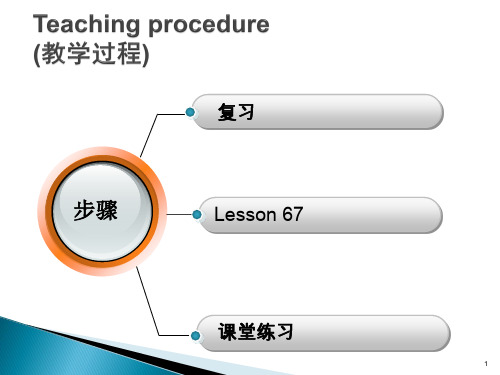
26
How are you? How do you do? How are you all keeping? How are you doing? How is everything going? How is it going?
那一般我们都怎么回答呢?
Not bad. Pretty well. Very well. Great. I’m OK. Just so so. How do you do! Fine. Not so good.
复习
步骤
Lesson 67
课堂练习
1
你今晚要去做什么? 我要去见一些朋友。 你不准太晚回家。 大门的钥匙 把钥匙给她 好吧 不客气 玩的开心
2
时间的表达方式: 1.顺读法 2.倒读法 a.past b.to 3.倒读法练习 1:05 1:10 1:15 1:20 1:30 1:40 1:45 1:50 1:58 1:59
33
在肉店里
Where were you on Wednesday, April 4th?
I was at the butcher’s on Wednesday, April 4th.
34
在理发店里
Where were you on Thursday, May 5th?
I was at the hairdresser’s on Thursday, May 5th.
29
I spend a lot of money on clothes. I spend a lot of money (in)buying clothes. eg. 学生每天都花时间写作业
新概念英语第一册第67课
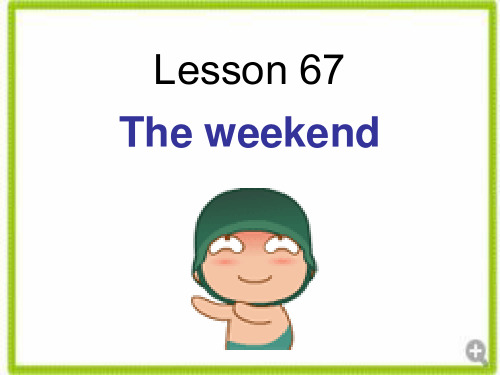
一般过去时
• 一般过去时(simple past tense)表示过去 某个时间里发生的动作或存在的状态,常 和表示过去的时间状语连用,如yesterday, last night,in 1990,two days ago等。 • 一般过去时也表示过去经常或反复发生的 动作,常和often,always等表式频率的时 间状语连用。
一般现在时
一般过去时
is , am are
→ →
was were
一般过去时结构
含有be动词(过去的状态)
肯:主语+was/were +其他. 否:主语+wasn’t/weren’t +其他. 疑:Was/Were +主语+ 其他? 答:Yes,主语+was/were. No, 主语+wasn’t / weren’t.
absent adj. 缺席的
• • • • • be absent from 上星期她没去上学吧? Was she absent from school? 我昨天没上班。 I was absent from work yesterday.
keep
v.
身体处于…状态,保持
• How are you all keeping? • How is your mother keeping? • Please keep the door open.
规则变化的动词过去式
1 直接加ed: work—worked look—looked 2 以不发音e结尾的单词,直接加d: live —lived use—used, 3 以辅音字母+y结尾的,变y为i加ed: study— studied carry—carried 4以元音字母+y结尾的,直接加ed: enjoy —enjoyed play—played 5 以重读闭音节结尾的,双写+ed: stop— stopped plan—planned
新概念英语第一册Lesson67_72语法及单词

新概念英语第一册Lesson67~72语法及单词新概念英语第一册Lesson67~68语法及单词语法Grammar in use一般过去时be( am/is/are)的过去式是was/were:在英文中,过去发生的而现在已经结束的动作要用一般过去时来表示。
be动词的过去式不规则,第1人称与第3人称单数用was,其他情况用were。
用be动词的一般现在时形式的一般疑问句及特殊疑问句迄今已介绍过,其过去时形式也一样,只是动词be在形式上变为was或were。
请看以下例句:Was Mrs.Johnson at the butcher’s?约翰逊夫人在肉店吗?No,sha wasn’t.她不在。
Were you at school or at church ou January 1st ?1月1号你在学校还是上教堂了?I wasn't at school on January 1 st .I was at church.我1月1号没上学。
我上教堂做礼拜了。
When was he absent from school ?他何时缺课了?He was absent on Monday,Tuesday,Wednesday and Thursday . 他周一、周二、周三和周四缺课了。
Where were you on Sunday ?周日你在哪儿?I was at church on Sunday.我周日在教堂做礼拜。
词汇学习Word study1. spend v.(1)花(时间等);度过:Where are the Johnsons going to spend the weekend ?约翰逊一家准备到哪儿去度这个周末?I hope that you wouldn’t spend so much time watching television.我希望你不要花这么多的时间看电视。
(2)用(钱),花费:I’m going to spend all my money this weekend !这个周末我要把我所有的钱都花掉!At present,more and more people have come to realize that more money should he spent on health and education.目前,越来越多的人已开始认识到:应该在健康和教育方面多花些钱。
新概念第一册 Lesson 67-68

否定疑问句
Aren’t you lucky! 你们真幸运啊! 否定疑问句形式的感叹句,为的是加强语气。尽管形式时否定的, 但表示强有力的肯定。
参考译文
约翰逊夫人:您好。刚才您在肉店里吗? 威廉斯夫人:是的,我在肉店里。您也在肉店里吗? 约翰逊夫人:不,我不是。我在蔬菜水果店里。吉米今天怎么样? 威廉斯夫人:他很好,谢谢您。 约翰逊夫人:上星期他没上学吧? 威廉斯夫人:是的,他没上学。他星期一/星期二/星期三和星期四没去上学。
keep
keep /kiːp/ v. (身体健康)处于(状况) keep doing sth (something) 持续做某事
spend
spend /spend/ v. 度过,花费 spend time(money)on sth spend time(money)in doing sth 花时间(钱)在某事上/做某事
一般过去时(simple past tense)表示过去某个时间里发生的动作或状态; 过去习惯性、经常性的动作、行为。 be动词的一般过去时: 肯定句:主语+be动词的过去式+表语 be动词的过去式不规则:am, is – was (过去式); are - were (过去式)
e.g. I was at the greengrocer’s. 否定句:主语+was(were) not +表语
你们身体都好吗? 约翰逊夫人:很好,谢谢您。我们打算到乡下去三天,在我母亲家度周末。 威廉斯夫人:星期五、星期六和星期日在乡下过!你们真幸运啊!
Role-play
MRS.JOHNSON: Hello. Were you ___ the butcher’s? MRS.WILLIAMS: Yes, I was. Were you at the butcher’s, too? MRS.JOHNSON: No, I wasn’t. I was at the ________. ____’s Jimmy today? MRS.WILLIAMS: He’s very ___, thank you. MRS.JOHNSON: Was he absent _____ school last week? MRS.WILLIAMS: Yes, he was. He was absent ___ Monday, Tuesday, Wednesday
新概念英语第一册-L67-the-weekend专题市公开课获奖课件省名师示范课获奖课件

一般目前时
❖ We are doing our housework now.
❖
正在
❖ The bus is leaving at 8:00.
进行
❖
时
❖ 主语+ be动词(was,were)+其他 ❖ 主语 + 实意动词旳过去式形式+其他 ❖ (实意动词:有确切含义旳动词,能够单独做谓语,
如:played等)
morning
yesterday afternoon
evening
the day before yesterday
4.与one 连用: morning evening
one day
Monday afternoon
5.与that 连用:
that
morning winter day year
6.其他时间状语:
Children spend a lot of time on Internet. 孩子 们花费诸多时间上网。
spend 时间/金钱 +(in) doing sth.
The manager spent 2 hours(in) explaining the plan at the meeting. 在会上,经理用两个小时来解释这个计划
他在城里住了将近三十年,可还是土气十足。
★ lucky adj. 幸运旳
[ˈlʌki] ① adj. 有好运旳,幸运旳
She was lucky to get such a well-paid job. 她能得到这么一种酬劳优厚旳工作真幸运。
② adj. 侥幸旳,恰巧旳
He didn’t really know the answer - it was just a lucky guess.
- 1、下载文档前请自行甄别文档内容的完整性,平台不提供额外的编辑、内容补充、找答案等附加服务。
- 2、"仅部分预览"的文档,不可在线预览部分如存在完整性等问题,可反馈申请退款(可完整预览的文档不适用该条件!)。
- 3、如文档侵犯您的权益,请联系客服反馈,我们会尽快为您处理(人工客服工作时间:9:00-18:30)。
2.Was Jimmy at school last week?
No, he wasn’t.
3.When was he absent from school?
• Mrs.Johnson:Were you at the butcher’s? • Mrs.Williams:Yes,I was.Were you at the butcher’s,too? • Mrs.Johnson:No,I wasn’t.I was at the greengrocer’s. How is Jimmy today?
spend的过去式spent花费,主语为人,一般与in/on .搭配。 Last month/year…
spend,与cost 的区别
• 都是花费的意思,spend的主语是人,cost 主语是物,比如, • 我花了400RMB买了一辆新的自行车。 • I spend 400yuan in buying a new bike. • I spend 400yuan on the new bike. • The new bike costs me 400yuan.
Monday Tuesday Wednesday
Thursday Friday
Saturday Sunday
absent absent Jimmy Jimmy
absent Jimmy
absent Jimmy
In The John son’s
country family
• ----Were you at the butcher’s? • ----Yes,I was.
【过去式的变化规则】
• ① 一般情况下,在动词原形后直接加ed。 如:wanted, played。 • ② 以不发音的字母e结尾的动词,直接加d。 如:hoped, lived。 • ③ 重读闭音节单词需双写最后一个辅音字母,再加ed。 如:stopped, shipped。 • ④ 以辅音字母+y结尾的动词变y为i,再加ed。 如: studied,worried。 • ⑤ 有些动词不符合上面的规则,需要特殊记忆。 如: am(is)-was, are-were, go-went, do-did eat-ate, swimswam, buy-bought, see-saw, teach-taught, bringbrought, think-thought, fall-fell, hurt-hurt, break-broke, win-won, lose-lost
★ pay [人做主语,人为某物付钱]
pay for sth eg. I paid him for the rent. 我付给他房租.
★country 乡村
① n. 国家;国土;故乡
n.
② n. 乡下,乡村 country表示“农村”时,前面一 定要加定冠词the。
③ adj. 乡下的;乡村风味的
eg.I hope that you wouldn’t spend so much time watching television. 我希望你不在看电视上浪费太多 时间. eg. Where are the Whites going to spend the weekend? 这周末White一家要在哪过?
No,she wasn’t.
2.Where was she?
She was at the greengrocer’s.
3.Who was at the butcher’s?
Mrs.Williams was.
Listen again,then answer the questions.
1.How is Jimmy today?
• Not bad. • Pretty well. Very well. • Great. • I’m OK.
缺席,注意介词要用from
• Was he absent from school last week? • We are going to spend three days in the country.
★keep
翻译: eg. Keep the fire burning.
v.
(身体健康)处于(状况);保 存,保留保守;储藏
让火一直燃烧。
eg.He would not be able to keep his job. 他保不住自己的工作了。 eg.Would you keep my things for me while I’m away?当我离开的时候,你能为我保管一 下我的东西吗?
句型转换:
1. I was at home yesterday?(一般疑问句,做肯定和否定回答)
1. She was very short last year.(否定句)
2. The boys were at school last Monday.(提问)
3. I was at the office yesterday.(提问)
Find out the mistakes
• • • • •
were Was you at the butcher’s? was Yes,I were. How are Jimmy today? is Was he absent to school last week? How are you all keep? keeping
★absent
adj.缺席的
be absent from 不在,缺席 • be absent from school 缺 课 • be absent from work 旷工 eg. She doesn’t like school, so she is often absent from school. 她不喜欢上学,所以她经常缺课。
• Mrs.Johnson:Very well,thank you. We are going to spend three days in the country. • We are going to stay at my mother’s for the weekend. • Mrs.Williams:Friday,Saturday and Sunday in the country! Aren’t you lucky!
•
。
★spend
v. 度过
① v. 花(时间等);度过 spend + n./pron. 度过 eg.We are going to spend several days at my mother’s. 我们要在我妈妈家呆几天。 eg.I want to spend my holiday in the country this weekend. 我想这周末在乡下度假。
eg.I prefer country life to life in the city. 乡村生活与城市生活相比,我更喜欢乡 村生活。
eg.After nearly thirty years in the city, he’s still country. 他在城里住了将近三十年,可还是土气 十足。
Let’s practice .
1. I ___ ( be ) at school yesterday. But my parents _____ ( be ) at home.
2. This girl ___ (be ) ten years old.
3.My grandma ___ ( be ) young before. But she___ ( be ) old now.
② v. 用(钱),花费 spend 时间/金钱 + on +sth. eg. Women spend a lot of money on clothes. 女人都花很多钱来买衣服。 eg.Children spend a lot of time on Internet. 孩子们花费很多时间上网。 eg.At present, more and more people have come to realize that more money should be spent on health and education.
4. The children ______ ( be ) at the library last Sunday. Now they____ ( be ) in the park. 5. Mrs. Smith ____ ( be ) at the cinema just now. Two hours ago she ____ ( be ) at home.
Mrs.Johnson
Mrs.William
1.Was Mrs.Johnson at the butcher’s? Where was she? 2.Who was at the butcher’s?
listening
Mrs.Williams Mrs.Johnson
1.Was Mrs.Johnson at the butcher’s?
• Mrs.Williams:He’s very well,thank you. • Mrs.Johnson:Was he absent from school last week? • Mrs.Williams:Yes,he was. • He was absent on Mon,Tues, • Wed,and thurday. • How are you all keeping?
am,are的过去式是were is的过去式was
were的否定weren’t
was 的否定 wasn’t
• How is Jimmy today? • How are you? How is she/he? • How are they?
